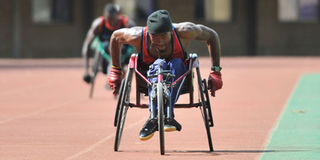Wheelchair racers have plateful ahead of London

Joseph Tebandeke races to the finish line during the National Trials of the 400m Wheel Chair category at Mandela Stadium, Namboole last year. Photo by ISMAIL KEZAALA
KAMPALA.
The qualifications times for the 100m, 400m and 1500m races in the forthcoming World Para Athletic Championship are: 15.15 seconds, 50 seconds and 3:09.00 minutes respectively.
However, none of the three wheelchair racers has hit any of those marks in the recent para-athletic trials and worries are loud they might fail to secure a place for the London Games due July.
During the previous national trials at Namboole Stadium, April 22, they scored as below: in the 100m Richard Ocira led on 17.8 sec, Joseph Tebandeke followed on 18.5sec while Nsubuga Kizito 20.8sec. In the 400m again Ocira led on 70.8sec, Tebandeke followed on 75.2sec and Kizito 83.5sec. In the 1500m Tebandeke led on 4:37.4min, Ocira followed 4:41.9min and Kizito 5:45min.
That is a precarious situation yet the athletes say it took them a lot to score those times.
“I’m two seconds behind time and you are not fair saying we are not performing,” was Tebandeke’s first response to us.
But he quickly admitted that slicing those two seconds in the 100m race in the trials that resume tomorrow at Namboole could be a mountainous task. Yet dropping those 20 seconds in the 400m race and the nearly two minutes in 1500m race could be as hard as distinguishing colours in the dark.
“We will try as much as we can but these wheelchairs are not favourable; it’s so hard to beat the time,” he said.
“Moreover, most times we train without a coach. If we can’t time ourselves appropriately, it’s hard to improve.”
Ocira duly agrees: “I have just begun wheelchair racing but seriously these wheelchairs are very slow and heavy and we don’t have a coach; maybe if the time (for 100m) was 18 seconds.”
Irene Nabisenke is a coach and an administrator at the Uganda Paralympic Committee. She is aware: “I understand their situation. Those wheelchairs are basically for training and are very heavy. Athletes abroad use up-to-date chairs which are very swift and personalised to fit the user’s disability.”
On coaches, she said: “Athletics is a wide sport but we don’t have coaches well-versed in wheelchair racing, besides most are volunteers so you can’t demand them fulltime commitment.”
So where is hope? “If only we could get better wheelchairs.” But for now, the London dream is bordering on futility.




